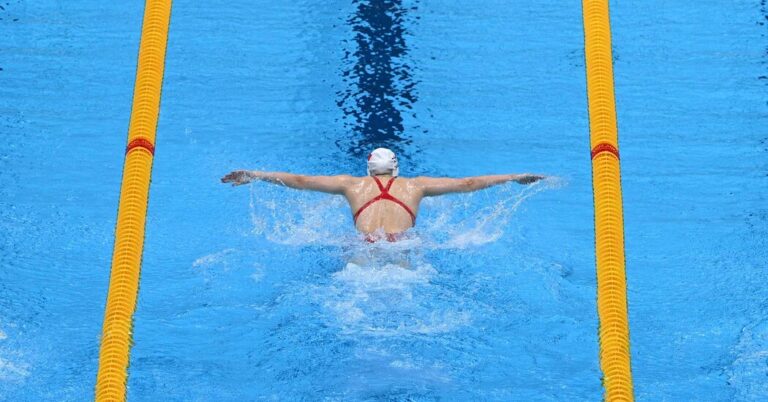The Justice Department has opened a criminal investigation into how anti-doping officials and sports officials allowed top Chinese swimmers to escape punishment at the last Olympics and win numerous medals, including three golds, after testing positive for banned substances, according to two people familiar with the matter and swimming’s international governing body.
The decision to move forward with a criminal investigation is an intensification of sharp U.S. condemnation of China, global anti-doping agencies and the Olympic movement, and is likely to cast a criminal shadow over the Summer Olympics, which are due to open in Paris later this month.
Eleven of the swimmers who tested positive were never suspended for doping and are back on China’s Olympic team, including several who are once again medal favorites.
Information about the investigation emerged just over two months after The New York Times reported that the World Anti-Doping Agency and Chinese anti-doping authorities had declined to take disciplinary action against 23 top Chinese swimmers who tested positive for banned substances in early 2021. The decision not to suspend the athletes and to keep their positive tests secret paved the way for the swimmers to compete and win medals at the Tokyo Olympics.
The Times reported that the FBI has known about the positive tests and the players’ decisions to deny any wrongdoing for the past year, and that federal investigators have taken steps in recent weeks to learn more about what happened, but it is unclear whether a full criminal investigation has been opened into the matter.
Federal agents contacted the secretary-general of World Aquatics, the international swimming federation, last month while he was in the United States for the US Olympic Trials in Indianapolis to discuss how the positive test results were handled, according to two people briefed on the matter, who declined to be identified discussing an ongoing investigation.
It is unclear what China’s swimming federation’s executive director, Brent Nowicki, told officials in his communications. Nowicki took up the job in June 2021, days before Chinese authorities informed the World Anti-Doping Agency and World Aquatics that they had decided not to treat the positive tests as anti-doping violations.
As part of negotiations with investigators, Nowicki received a grand jury subpoena, according to a statement from World Aquatics.
“World Aquatics can confirm that Executive Director Brent Nowicki has received a witness subpoena from the U.S. government,” World Aquatics said in a statement. “He has scheduled meetings with the government and will likely not be required to testify before a grand jury.”
It’s unclear how useful Nowicki will be to investigators: He joined the swimming federation months after the positive tests and after China submitted documents to WADA outlining how and why it had exonerated its athletes.
The World Aquatics Federation’s statement was first reported by The Associated Press on Thursday.
Evidence has also emerged that World Anti-Doping Agency (WADA) officials are aware of ongoing enforcement action by US authorities: Late last month, WADA canceled a meeting with other anti-doping agencies and sports officials that had been scheduled for later this year in the US.
In a conference call announcing the cancellation, WADA officials said one of the reasons the conference was being canceled was because agency leaders didn’t want to travel to the United States because of the ongoing federal law enforcement investigation, according to Travis Tygart, director of the U.S. Anti-Doping Agency. Tygart, one of WADA’s fiercest critics, did not attend the call, but one of his deputies was, the report said.
The federal investigation is being conducted in part by authorities in Boston, who have interviewed at least two witnesses, according to two people briefed on the matter.
The escalation of the case is perhaps the most significant doping investigation since the United States passed legislation known as the Rodchenkov Act in 2020, which criminalizes doping at top-level international sporting events no matter where they are held. The investigation marks the first time U.S. authorities have focused on an international sports organization under the law. WADA has criticized the new law since it was first proposed, arguing that criminalizing doping in one country would undermine WADA’s efforts to maintain uniform rules in sports around the world.
At issue in the swimming case is the fact that the World Anti-Doping Agency agreed with China’s claim that the positive tests for banned substances (prescription heart medications) were the result of a “mass contamination event,” but some other anti-doping experts and officials have called this claim highly dubious and charged that the lack of punishment or identities of the athletes suggests a massive cover-up.
In response, Congress asked the FBI to open an investigation in May, and a congressional committee has also launched its own investigation, including one last week in which Michael Phelps, the most decorated swimmer in Olympic history, testified about the need for accountability.
WADA’s anti-doping officials have been scrambling to protect the organization’s reputation and defend its handling of the cases since the 23 cases were first made public. They have held numerous meetings with hundreds of athletes and stakeholders, including national anti-doping agencies. But these efforts have failed to allay many concerns, and WADA has yet to release any of the information it relied on in making its original decisions.
A report by an independent prosecutor hired by WADA to investigate the decision-making is due to be published before the Olympics, but it may not be enough to stave off controversy before the games begin amid concerns about the independence of the Swiss official hired for the job.
World Aquatics officials stressed that they were being interviewed as witnesses and not as part of the federal investigation. WADA declined to comment.
The importance and timing of the U.S. investigation is particularly significant given the U.S.’s ties with the International Olympic Committee. Los Angeles is slated to host the 2028 Summer Olympics after Paris, and Salt Lake City has been given preferred bidder status by the IOC in its bid for the 2034 Winter Olympics.

